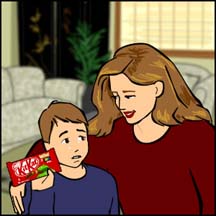Update 46
Resources
Office Manager's message
 Hello. I’m Verity Croft,
Hello. I’m Verity Croft,
Baby Milk Action’s new Office Manager.
It's great to have this opportunity to introduce myself and to give you an understanding of what I do and how I can help you support our work. My role is wide-ranging but so far it has centred on reviewing and updating our fundraising merchandise range to ensure it is: useful to our supporters; up-to-date and hopefully profitable (to ensure our continued independence). Over the coming months we will be launching a number of new campaign logos on our merchandise which will be highlighted on our online shop so keep an eye out and your wallet ready!
Baby Milk Action is blessed to have many committed volunteers and Area Contacts who staff stalls, attend conferences and help deliver our message to a wide audience. I provide the office support they need prior to the events: arranging schedules, merchandise, give-aways and briefings. I am available at the end of the phone (10am-2pm) so give me a call if you have questions or want to become more involved in helping us (01223 464420).
We really value our Members, not just for their much needed financial input, but also for their feedback and support. We are still offering a free 2014 Breastfeeding Calendar as a thank you to anyone who signs up to our £18 annual membership by Bankers Order or PayPal subscription. For details see our website or contact me directly. I’m really looking forward to hearing from you and working with you over the coming year.
Verity.

Our new Monitoring Kit includes pocket-sized cards to carry with you for a quick reminder of the baby milk marketing rules in the UK. The reverse side explains how to report violations.
Full details of the kit are in our Virtual Shop.
Infant Formula Explained DVD and iPhone app
SPECIAL OFFER: Order the 2011 edition at reduced price and receive your money back when you buy the next edition due in 2014. We will be updating to reflect the fact goat's milk formula is now allowed. See the Virtual Shop for details.
Films included: 25-min for health workers, 7-min for parents and carers; 10-min with WHO guidance on making up powdered formula. 7 and 10 min films are available in an iPhone app.
Special thanks to Lara Cowpe and Sian Evans
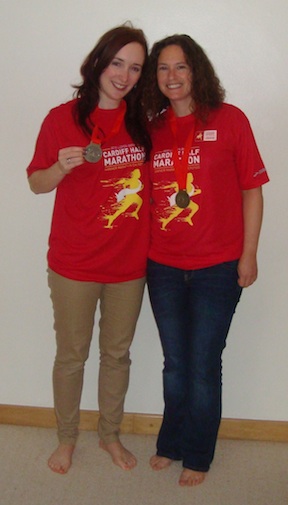 Lara and Sian ran the Cardiff Half Marathon and raised £400 for our work.
Lara and Sian ran the Cardiff Half Marathon and raised £400 for our work.
Contact us if you would like help fundraising for a sponsored event. We can create a page for you on our website, as we did for Lara and Sian.
Other Nestle news
Nestlé and Google join forces – watch out!!
Google Might Have Walked Into A Nestle Boycott Problem With Android KitKat. So said the influential business magazine Forbes in reporting that the new Google smartphone operating system has been called Android KitKat.
Joy of Tech produced a cartoon highlighting the scary prospect of an 'omnipresent technology company' joining forces with Nestlé (view full version).
Forbes contributor, Tim Worstall, said Google may have overlooked something:
That’s the way in which there has been a long running boycott against all Nestle products. A very minor part of it comes from mineral water: there are those who think that if tap is good enough for them then no one should use the bottled kind. A rather more serious part of it comes from the production of baby formula.
Forbes linked to our Nestlé-Free Zone as evidence of the ongoing boycott: http://info.babymilkaction.org/nestlefree
The absurdity of the bottled water market is demonstrated once again as Nestlé launches a bottled water called Resource, aimed at 'a woman who is a little more on the trendy side and higher-income side, and the bull’s-eye is 35 years old.' The difference between this 'premium water' and other bottled water? The marketing and the price.
Nestlé Waters takes to youtube
Nestlé took offence at a news feature by Abby Martin on its bottled water business and posted a youtube clip in response – rather than accept an invitation to appear on her show. Abby, in turn responded to Nestlé’s comments.
For example, she had cited the Council of Canadians figures that Nestlé pays USD 3.71 for every million litres of water, which it then bottles and sells for as much as USD 2 million.
She acknowledged Nestlé’s point that this is not all profit as there is the expense of the plastic bottles, storage, transport etc. And marketing too, to persuade people to buy bottled water (or even 'premium water') rather than drink what comes out of the tap – with or without home filter.
See: http://youtu.be/cxf9UtltFuY
Waters campaigners win in Ontario
In October 2013, Wellington Water Watchers, Ecojustice and the Council of Canadians successfully stopped an attempt by Nestlé to have drought restrictions dropped from one of its water taking permits in Wellington County, Ontario, Canada, where Nestlé already pumps and packages 1.13 million litres of groundwater per day.
Nestle's Creative Storytelling Venture
Look at what Nestlé does not just what it says
You always need to look beyond what Nestlé says if you want to see the truth about its business operations – and understand the tactics it uses to divert criticism.
For example, in 2013 Nestlé issued a press release, Nestlé among top performers in new Access to Nutrition Index (ATNI). This is an initiative developed by the Global Alliance for Improved Nutrition (GAIN - pg 14).
Nestlé scores well for promoting processed foods to the poor through its much criticised 'Popularly Positioned Products' and making statements that may sound good.
However, Nestlé droped the second part of the ATNI assessment, highlighted below:
Nestlé is among the top three performers in the ATNI Global Index and it performs well in almost all areas assessed by ATNI with the exception of its marketing practices related to breast-milk substitutes.
Breastmilk substitutes is the one area where ATNI considers monitoring of what companies are actually doing – not just their statements and management policies, looking to evidence in IBFAN’s reports.
What Nestlé says:
There is no question about breast milk being the best start a baby can have in life. Nestlé firmly believes that breastfeeding is the best way to feed a baby and is strongly committed to its protection and promotion.
Nestlé takes very seriously its responsibility to ensure that our marketing practices abide by the World Health Organisation’s International Code of Marketing of Breast-milk Substitutes. We have implemented extensive measures to ensure strict compliance with it.
What Nestlé does:
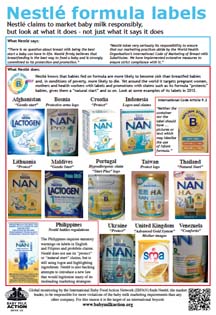 Nestlé knows that babies fed on formula are more likely to become sick than breastfed babies and, in conditions of poverty, more likely to die.
Nestlé knows that babies fed on formula are more likely to become sick than breastfed babies and, in conditions of poverty, more likely to die.
Yet around the world it targets pregnant women, mothers and health workers with labels and promotions with claims such as its formula 'protects' babies, gives them a 'natural start' and so on.
● Download Baby Milk Action's poster with a selection of Nestlé labels from around the world.
Nestle's Creative Storytelling Venture
Mr Brabeck fails to convince as eco-warrior
Nestlé's Chairman, Peter Brabeck-Letmathé, likes to present himself as an environmental campaigner these days. It is a strategy to divert attention from the criticisms of many aspects of Nestlé's business under his rule. Yet it does not always go well: the Guardian interviewed him in January 2014 and reported,
While scientists point to the near certainty that human activity is driving up temperatures, Brabeck argues that it is largely down to Earth’s natural cycles, and warns against trying to play god by seeking to stop global warming. Instead, he believes society should focus on adaptation.
A self-serving view when your business is transporting processed food around the planet, competing with breastfeeding and local foods.
Mr Brabeck also went too far in using FTSE4Good to dismiss our evidence of unethical baby food marketing practices. FTSE4Good is an ethical investment index and Nestlé was not added until FTSE weakened the rules in 2011 (see our briefing). A company does not have to comply with the WHO Code to be added to the index. Nonetheless, the Guardian reports:
Brabeck also defended Nestlé against accusations by Baby Milk Action that it contributes to the unnecessary death and suffering of infants around the world by aggressively marketing baby foods.
We are the only infant formula producer which is part of FTSE4Good. We are being checked and controlled by FTSE4Good. They make their audits in different parts of the world and we have to prove that we are complying with the WHO code and up to now we can prove that in everything we are.
FTSE was not impressed, agreeing that Mr Brabeck's comments are inaccurate. Nestlé has been warned, not for the first time, not to use FTSE4Good's name in this way. But will Mr Brabeck care? After all, nobody knows what he tells government leaders and development organisations in private.
Nestlé’s 'human rights white paper' entitled 'Talking the Human Rights Walk' launched in December 2013 claims 'strong implementation of the WHO International Code' as an example of it best practice and that its 'ability to engage in a thorough and constructive discussion with our stakeholders will be an important driver of our success.'
Maude Barlow, founder of the Blue Planet Project and chairperson of the Council of Canadians and Food & Water Watch said,
The analysis is fundamentally flawed because it is a selective examination of corporate policy rather than corporate practice.
Baby Milk Action's analysis of the white paper is on our website (coming soon).
● Nestlé is one of the world's most widely criticised corporations according to the Ethical Consumer Research Association: it receives an Ethiscore rating of 1 on a scale from 0 (worst) to 15 (best) due to the volume of reports of malpractice across its areas of operation.

● Add this logo to your website or blog or order it on stickers and mugs.
Nestle's Creative Storytelling Venture
Nestlé 1000 Days initiative aims to boost formula sales
Nestlé held its Creating Shared Value (CSV) Global Forum in Colombia on Monday 28 October 2013, opened by the President of Colombia and Nestlé Chairman, Peter Brabeck-Letmathé, who arrived together.
As luck would have it, International Nestlé-Free Week started the same day as the Forum. The week is a time for people who boycott Nestlé over the way it pushes baby milk to do more to promote the boycott - and for those who don’t boycott to give it a go. Which meant that Nestlé’s twitter feed from the Global Forum became a channel for exposing its marketing malpractice.
The academic Michael E. Porter of Harvard Business School (and advisor to UK Labour Party leader, Ed Miliband) summed up CSV in Global Forum soundbite: 'When business can address social issues with a business model we have the magic.'
By 'magic' he means that if a company finds a way to make a profit from addressing a social issue it will invest to make money. If an initiative requires public money, then the more it grows the more governments have to put into funding it.
One of Nestlé's Directors, Ann Veneman spoke on the 1000 Days concept (she was billed as former UNICEF Director, with no mention that she now works for Nestlé).
Publicly Nestlé says it is supporting health education on the importance of good nutrition in the 1000 Days from conception to two years old. What it tells investors is it has products to sell throughout the period: milks for mothers, formulas and growing up milks.
The slides above and below are from a Nestlé presentation to investors on 30 September 2013 (click on the images for larger versions). As part of its 1000 Days initiative, Nestlé pushes its formula with 'gentle start' claims in its 'Project Happy', which it boasts has been delivering strong sales growth (see pg 28 for Nestlé formula claims).
These CSV events help Mr Brabeck meet and influence policy makers. President Santos of Colombia announced at the Forum that he would be working on a free-trade agreement to make Colombia a major milk exporter and said he looked forward to working together with Nestlé in this area.
Action on Nestlé human rights abuses in Colombia
The European Center for Constitutional and Human Rights (ECCHR) is pursuing Nestlé through the Swiss courts in the case of trade unionist Luciano Romero, murdered by paramilitaries in 2005.On 9 January 2014 it said:
The murder of another Nestlé-worker and trade unionist in Colombia in November 2013 clearly demonstrates that the position of Nestlé towards its trade unionists has not changed....This recent murder was again preceded by defamations through the Colombian Nestlé management. Contrary to statements made on the company’s website and during conferences, Nestlé has clearly not yet adopted an approach to dealing with its workers and trade unionists, which does not present a danger to their lives.
Nestlé's human rights white paper (pg 27) includes a case study on Colombia that makes no mention of the above or other cases (see past Updates).
Publications and research
Flawed research questions breastfeeding benefits

Research from Ohio University generated headlines around the world at the end of February by asking 'Is Breast Truly Best?' and suggesting not (the Daily Mail and Slate shown above). Our blog posting looking at the research more objectively received 10,000 visits the first weekend.
The research looked at a set of historic data and found that overall breastfed children did significantly better than formula-fed children. However, the researchers highlighted that in a subgroup no benefits were found from breastfeeding, comparing a child who may have only been breastfed once with a sibling who had no breastmilk at all. Professor Mary Renfrew told us this was one of the flaws: 'The exposure measures for breastfeeding were very crude. There was no measure of exclusivity, for example.'
Then out of 11 factors examined, 8 were to do with behavioural or scholastic outcomes at the ages of 4 to 14, such as their maths ability and vocabulary. Finding little difference between the subgroup children, they concluded that factors such as their parents' education have a bigger impact than how the children were fed.
The only health outcomes included in the research paper were body mass index (BMI), obesity and asthma. Drawing conclusions on the first two of these three is a difficult task in a country where over 35% of the population are classified as obese and nearly 70% have a BMI that classifies them as overweight or obese, particularly if one sibling may have been only partially breastfed. There is other evidence of less obesity in breastfed children and the Centre for Disease control suggests breastfeeding may help explain a recent fall in obesity rates (pg 24).
The NHS review of this research pointed out that in the subgroup of brothers and sisters fed differently there was actually no difference between reported asthma outcomes, from which you could conclude the feeding method does not have an impact on asthma risks if you follow the same logic the researchers use for reading and maths ability etc.
Not investigated was why did the mothers in the subgroup feed their children differently? The researchers simply say, 'all of the scenarios we can call to mind in which siblings are differently fed favor the breastfed sibling.' Really? How about: mother has a difficult breastfeeding experience that leaves her and her child distressed, so she switches to formula and then uses formula for her other children? That is all too common where breastfeeding support is lacking. There is no right to paid maternity leave in the US, so mothers are already facing severe obstacles when caring for young children.
Some have seized on the study to suggest that advocates should shut up about breastfeeding. However, the Breastfeeding Medicine blog pointed out the study authors drew a different conclusion:
If the secret ingredient is 'being born in a family where breastfeeding is possible,' then creating the conditions that enable families to breastfeed must be our highest priority. The take-away is that we need to fight for paid parental leave, high-quality childcare and a living wage for every family, regardless of how they decide to feed their infants.
• Colen, C.G., Ramey, D.M., Is Breast Truly Best? Estimating the Effects of Breastfeeding on Long-term Child Health and Wellbeing in the United States Using Sibling Comparisons, Social Science & Medicine (2014), doi: 10.1016/j.socscimed.2014.01.027.
Breaking the Rules 2014
Nestlé and Danone in fierce competition
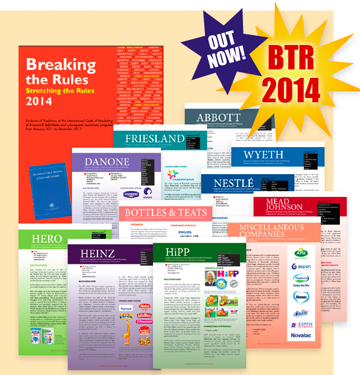
IBFAN’s International Code Documentation Centre (ICDC) has published an online version of Breaking the Rules, Stretching the Rules 2014. The executive summary is free to download. ICDC explains:
BTR 2014 is the result of three years of collective voluntary effort to compile evidence on marketing practices by baby food companies around the world. The final report contains 813 entries from 81 countries and covers 27 companies.
The Executive Summary gives an overview of new marketing trends. Here are edited highlights:
Competition has increased and breastfeeding declines as a result. The market is so profitable that further acquisitions have led to more concentration, leaving two global leaders in fierce competition: Nestlé and Danone. Smaller companies are just as aggressive and the lucrative Chinese market is attracting new export investments from Canada and Ireland.
● Chasing dragon profits
Most baby milk companies are targeting China's lucrative USD 12.4 billion infant formula market. Potential consumption is projected to hit USD 25 billion by 2017. Companies battle to corner market share (over 20 million babies born each year) and as demand exceeds supply for imported products, prices are jacked up. The escalating price of infant formula sparked an investigation by the competition authority, the Chinese National Development and Reform Commission (NDRC). In 2013, six companies were fined USD 108 million for price-fixing. Five of them are in this report: Mead-Johnson, Abbott, Dumex, Friesland and Fonterra. Both Wyeth and Dumex immediately cut their formula prices by 11 to 20%.
● Social Media
Social media – new heyday for marketing. Social media - Twitter, Facebook, YouTube, Instagram, Google+, etc. – provide a new avenue for companies to advertise products on electronic communication channels. These mobile and web-based technologies use ‘behavioural targeting’ offering a plethora of opportunities for companies to interact directly with unsuspecting consumers. Popular bloggers are roped in to endorse products and thus influence their huge following.
● The New Jewel in the Crown
Growing-up milks (GUMs). Baby food companies maintain GUMs are not covered by the Code but the scope of the Code is clearly wide enough to include them.
GUMs or fortified ‘Toddler milks’ are used by many companies to cross-promote infant formulas and follow-up milks. Aggressive marketing has made this the best-performing segment within the overall market. GUMs lead the growth of the baby food market, approaching a value sales gain of 17% in 2012, followed by 12% for follow-up milks. Toddler milk now accounts for one-third of the global milk formula market by value.
● Sponsorship
Thanks to the internet and social media, evidence of companies blatantly giving sponsorship to health professionals are now more visible in the public domain. In the past, the information regarding such practice was often heard of but seldom seen; in this day and age, photos are uploaded on social media for all to see. Doctors, nurses, midwives, nutritionists are the most targeted groups with air tickets and expenses for expensive conferences, gifts including top of the line laptops, lucky draws and the like. We report with photo evidence from unexpected corners like United Arab Emirates, Turkey and Iraq.
● If you cannot beat them, join them!
Infant formula makers have always marketed their products with messages that suggest that their products are nearly as good as breastmilk and some even giving the impression their formulas are better than breastmilk. The common trend is to say that the particular formula is 'closer than ever to breastmilk' or 'inspired by breastmilk'.
Wyeth, now owned by Nestlé, started a new product line called Illuma, a 'human affinity formula'. Product promotion praises the virtues of breastmilk and then carries on with a story about how they have spent years on research and 'learned from the breast' to find a concoction that includes a few nutrients also present in breastmilk.
● Jumping on 1000 days bandwagon
The 1,000 days between a woman’s pregnancy and her child’s 2nd birthday is a critical period for long term development. UNICEF and WHO have launched a global campaign for health and development through adequate nutrition during the critical '1000 days window of opportunity'.
Several baby food companies saw a golden marketing opportunity in this campaign (as shown below). They could join in the chorus and yet skew it into a promotion opportunity for their products.
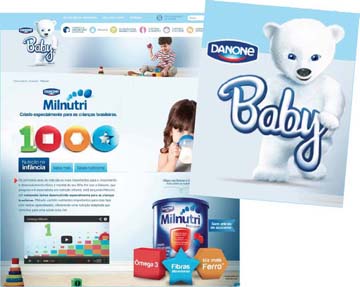
● Encouraging Mixed Feeding
In their pursuit to increase sales, formula companies have recently become bolder by suggesting to mothers that they can do both – formula feed and breastfeed at the same time.
● Conclusions: blame marketing
The Global Trends in Exclusive Breastfeeding rates (UNICEF 2012) are on the rise, but the proportion of exclusively breastfeeding mothers in East Asia fell from 45% in 2006 to 29% in 2012. In Indonesia the figures are 10% down. In the Philippines only 17% are now breastfeeding.
● Download the full Executive Summary for free along with Legal Updates.
Order the Breaking the Rules at http://www.ibfan-icdc.org/


IBFAN’s monitoring is not a statistical exercise, but it is clear that Danone (profile extract, above left, 39 pages of violations) is becoming as bad as Nestlé (profile extract, above right 42 pages, not counting its new Wyeth acquisition) as they compete around the world.
Baby milk action has put four-point plans to executives of both Nestlé and Danone, calling on them to market their products responsibly – but the evidence shows that it takes laws and public pressure to force changes.
● Watch out for the DanoNO campaign alongside the Nestlé boycott (pg 12).
UK formula regulation
The UK sees Nestlé malpractice first hand
The UK is now seeing Nestlé baby milk marketing malpractice first hand. Nestlé completed its purchase of Pfizer Nutrition/Wyeth at the end of December 2012, giving it control of the SMA brand of formula.
Baby Milk Action wrote to Nestlé asking it to market SMA formula in line with the International Code and Resolutions (noting that it does not follow these rules elsewhere unless forced to). We also asked it to respect various rulings we have won against misleading advertising. For example, the Advertising Standards Authority (ASA) upheld our complaint against the claim that SMA is the 'best' formula – Pfizer Nutrition could not prove this claim.
Another important ruling from the ASA against Pfizer Nutriton (A12-197524) states:
We told [the company] not to produce marketing communications for infant formula except in a scientific publication or, for the purposes of trade before the retail stage, a publication of which the intended readers were not the general public.
Nestlé is ignoring this ruling, continuing to promote SMA infant formula on websites aimed at the general public. It has also put in place a team of Nutrition Representatives to promote SMA formula to health workers at events at hotels around the country – it is launching SMA HA. It often uses guest speakers to try to entice them along to bypass restrictions on meeting health workers on health facility premises.
 We have been organising small, polite protests outside events. The example left was in Cambridge, where Addenbrookes Hospital told staff that they could not attend in work time. However, several student midwives turned up from a nearby college for a talk on water birth – with a session on formula by the Nestlé Nutrition rep. The protest prompted a debate at the college about conflicts of interest and it is now policy to discourage students from attending company events.
We have been organising small, polite protests outside events. The example left was in Cambridge, where Addenbrookes Hospital told staff that they could not attend in work time. However, several student midwives turned up from a nearby college for a talk on water birth – with a session on formula by the Nestlé Nutrition rep. The protest prompted a debate at the college about conflicts of interest and it is now policy to discourage students from attending company events.
The Royal College of Physicians (RCP), a member of the Conflict of Interest Coalition, said it was unaware that Nestlé was behind the event on the ‘Ins and Outs of Infant Care’ held on its premises on 9 July 2013 and would not host Nestlé in future. Nestlé issued a statement on its website rejecting the RCP's claim.
Nestlé no longer gives public information on where the events will be held, instead requiring those interested to register via its website – where it promotes its SMA formula.
Find out more about forthcoming protests.
● Are you a health worker? Why not order a mug to show your independence from Nestlé and Danone (pg 12 and pg 27).
● See First Steps Nutrition Trust briefing: Partially hydrolysed whey based infant formula and the prevention of allergy: A summary of current evidence and policy. http://goo.gl/Xiy0BK
Independent assessment of company information
 The Lancashire Infant Feeding Information Board (LIFIB) invites company reps. to present information on their products to designated experts. Its February bulletin assesses the claims made for SMA HA and milks from other companies.
The Lancashire Infant Feeding Information Board (LIFIB) invites company reps. to present information on their products to designated experts. Its February bulletin assesses the claims made for SMA HA and milks from other companies.
To receive the bulletin contact:
LIFIB@outlook.com or @The_LIFIB
UK formula regulation
Medela violates the International Code

Can a feeding bottle really enable 'babies to maintain their natural feeding behaviour learned on the breast'?
That is the claim from Medela for its Calma bottle and teat. Medela promotes it as 'the unique breastmilk feeding solution for your baby.'
Under the International Code, companies are only permitted to provide health workers with scientific and factual information. The claims are misleading as Medela admits in response to posts about babies choking using the bottle :
We've found sometimes that Calma takes a little getting used to. Typically, babies suck vigorously at the beginning of a feed to stimulate let down. With Calma, relaxed sucking, similar to the middle of a feeding, works best. Many moms found that after a few tries, babies adjust their sucking at the beginning of the feed with Calma and that Calma helped immensely with the transition from bottle to breast.
If babies cannot suck on Calma in the way required to stimulate let down (milk flow from the breast), then surely they will have problems 'transitioning' to the breast.
UK formula reguation
Danone offers secret deals to student midwives
As Danone steps up its competition with Nestlé for the hearts and souls of health workers we have learned it is offering grants and meals to student midwives, its rep. telling them:
For me to give funding I will need each of you to sign an ethical practices form which is just for our own records to say we comply with the WHO code for the giving of funding etc and we keep it in a filing cabinet and it is strictly confidential.
This is normal practise and we ask all midwives and students to sign a form when we take them for lunch /dinner or give funding or literature out on first milks so it brings us more in-line with BFI.
BFI is the Baby Friendly Initiative, which says company reps. should not contact health workers. Information should only be passed to a designated expert member of staff who will assess information for accuracy and only communicate what is necessary.
Before I finish I wondered if you would ask the girls in you class if they fancied meeting up with me for dinner so I can tell them more about the way we work and events that will be coming up this year as they could be missing out. I will of course pay for dinner somewhere that suits everyone and just so you are aware that you can liaise and meet with me as long as it is in your own time and off trust premises.
Some of the lecturers don't approve of seeing formula reps due to BFI but as long as you stick to the rules and just keep it to yourself your fine. It is a shame really because we are here to help educate midwives so they can give the best advice and practise to mums.
● In 2011 we exposed Danone trying to recruit midwives off-the-books to staff its 'Careline'.
● Show your independence from Danone with our new stickers and mugs. Order from our online Virtual Shop.


